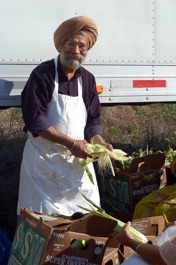Yuba City Nagar Kirtan
Sikh sons began arriving over a century ago from the fertile Punjab region of northern India to work in the fields and orchards of California’s Central and Imperial Valleys. From the first simple, wooden structure built in Stockton to the gilded dome of the recently completed temple in San Jose,
gurdwaras have offered shelter and sustenance throughout the state.
For the past ten years at a gurdwara in Yuba City, Taj Kaur rises every day before dawn to work in the temple’s cavernous kitchen. After tying back her hair with a saffron-colored headscarf, she begins patting and rolling and cooking roti. Softened with butter then wrapped in cloth napkins, the flatbread will stay warm for hours in a large, plastic cooler. More volunteers arrive throughout the morning.
One man peels a large sack of ginger while reciting his prayers. Another crushes spices for the day’s tea. Near huge, hemispherical karahi pans, a bevy of older women sit on low, wooden stools and pass the morning peeling potatoes, slicing eggplant and debating just how much sugar syrup the ladoo will require to form perfect balls.
As the first Sunday in November nears, though, this relaxed tempo of hospitality will grow to a festive pitch. On that day Yuba City hosts its annual Nagar Kirtan, or literally, the singing of hymns through the town streets. Nearly 80,000 people will join the religious procession alongside elaborate floats and the occasional tinsel-draped tractor. Packed into every available space near the road, volunteers from across the valley will fry pakoras, stir curries, stack trays of fresh fruit and tooth-numbing desserts, pour hot chai, and distribute icy water bottles as an expression of sewa, or community service, in the Sikh religion. Like the daily meals of the langar, this outpouring of food and drink is open and free to all who come.
November 2007


